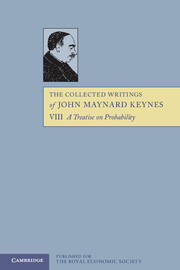Book contents
- Frontmatter
- Contents
- General Introduction
- Editorial Foreword by R. B. Braithwaite
- Editorial Note
- Preface to the First Edition
- I FUNDAMENTAL IDEAS
- II FUNDAMENTAL THEOREMS
- 10 INTRODUCTORY
- 11 THE THEORY OF GROUPS, WITH SPECIAL REFERENCE TO LOGICAL CONSISTENCE, INFERENCE, AND LOGICAL PRIORITY
- 12 THE DEFINITIONS AND AXIOMS OF INFERENCE AND PROBABILITY
- 13 THE FUNDAMENTAL THEOREMS OF NECESSARY INFERENCE
- 14 THE FUNDAMENTAL THEOREMS OF PROBABLE INFERENCE
- 15 NUMERICAL MEASUREMENT AND APPROXIMATION OF PROBABILITIES
- 16 OBSERVATIONS ON THE THEOREMS OF CHAPTER 14 AND THEIR DEVELOPMENTS, INCLUDING TESTIMONY
- 17 SOME PROBLEMS IN INVERSE PROBABILITY, INCLUDING AVERAGES
- III INDUCTION AND ANALOGY
- IV SOME PHILOSOPHICAL APPLICATIONS OF PROBABILITY
- V THE FOUNDATIONS OF STATISTICAL INFERENCE
- Bibliography
- Index
17 - SOME PROBLEMS IN INVERSE PROBABILITY, INCLUDING AVERAGES
from II - FUNDAMENTAL THEOREMS
Published online by Cambridge University Press: 05 November 2012
- Frontmatter
- Contents
- General Introduction
- Editorial Foreword by R. B. Braithwaite
- Editorial Note
- Preface to the First Edition
- I FUNDAMENTAL IDEAS
- II FUNDAMENTAL THEOREMS
- 10 INTRODUCTORY
- 11 THE THEORY OF GROUPS, WITH SPECIAL REFERENCE TO LOGICAL CONSISTENCE, INFERENCE, AND LOGICAL PRIORITY
- 12 THE DEFINITIONS AND AXIOMS OF INFERENCE AND PROBABILITY
- 13 THE FUNDAMENTAL THEOREMS OF NECESSARY INFERENCE
- 14 THE FUNDAMENTAL THEOREMS OF PROBABLE INFERENCE
- 15 NUMERICAL MEASUREMENT AND APPROXIMATION OF PROBABILITIES
- 16 OBSERVATIONS ON THE THEOREMS OF CHAPTER 14 AND THEIR DEVELOPMENTS, INCLUDING TESTIMONY
- 17 SOME PROBLEMS IN INVERSE PROBABILITY, INCLUDING AVERAGES
- III INDUCTION AND ANALOGY
- IV SOME PHILOSOPHICAL APPLICATIONS OF PROBABILITY
- V THE FOUNDATIONS OF STATISTICAL INFERENCE
- Bibliography
- Index
Summary
1. The present chapter deals with ‘problems’—that is to say with applications to particular abstract questions of some of the fundamental theorems demonstrated in chapter 14. It is without philosophical interest and should probably be omitted by most readers. I introduce it here in order to show the analytical power of the method developed above and its advantage in ease and especially in accuracy over other methods which have been employed. §2 is mainly based upon some problems discussed by Boole. §§3–7 deal with the fundamental theory connecting averages and laws of error. §§8–11 treat discursively the arithmetic average, the method of least squares, and weighting.
2. In the following paragraph solutions are given of some problems posed by Boole in chapter xx of his Laws of Thought. Boole's own method of solving them is constantly erroneous, and the difficulty of his method is so great that I do not know of any one but himself who has ever attempted to use it. The term ‘cause’ is frequently used in these examples where it might have been better to use the term’ hypothesis’. For by a possible cause of an event no more is here meant that an antecedent occurrence, the knowledge of which is relevant to our anticipation of the event; it does not mean an antecedent from which the event in question must follow.
- Type
- Chapter
- Information
- The Collected Writings of John Maynard Keynes , pp. 206 - 238Publisher: Royal Economic SocietyPrint publication year: 1978



